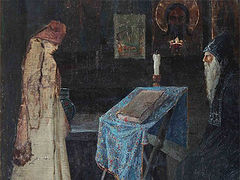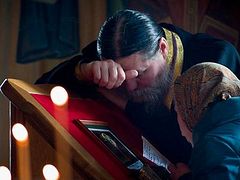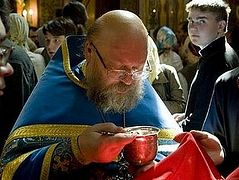The confessor of the Kiev theological schools Archimandrite Markell (Pavuk) speaks on the importance of the Sacrament of confession, about how to properly prepare for it and which sins and weaknesses to especially pay attention to, with what kind of attitude to approach the Sacrament with, about what to remember after having confessed, about lifetime confession, and on a repentant attitude.
—Father, bless. Besides your work at the Kiev Theological Academy and Seminary and the services, you also have the obedience as confessor of the Kiev theological schools. What does this obedience imply? Does it mean you’re the spiritual father for all the students?
—A spiritual father is a person who has the courage to guide others’ spiritual lives and to whom we are not afraid to reveal the most intimate things, which we don’t even always admit to our own father and mother. There are more than 300 students in the Academy and Seminary, and it’s simply physically impossible for one spiritual father to give them all attention. But, thank God, there are many other spiritual fathers in the Lavra to whom our students also confess. They are obligated to come to me only before their ordination to the diaconate and priesthood for a so-called lifetime confession.
I also see my task as constantly reminding the students, as future priests, about the importance of regular confession and Communion. Someone who is experienced in spiritual warfare will in the future be able to help those who are tempted. Thanks to regular confession, he learns to understand his feeling and distinguish good thoughts from bad. He thereby safeguards himself from making wrong and hasty decisions, and in the future, based on this, albeit small experience, he can guide others on the path of the Christian life. Not a single psychologist, even the best, can teach that.
Of course, much can be gleaned from the Holy Fathers of the Church, but their instructions also must not be hastily understood without advice from another, that is, without a spiritual father. If we were to try to fully fulfill all Patristic instructions recklessly, without help from another, we could fall into a dangerous state of prelest—a spiritual disease when a person is unable to critically evaluate his actions. I know some people who have studied the Holy Scriptures and the works of the Holy Fathers very well, but at the same time deviated into schism precisely because they relied on themselves, disdaining the advice of spiritual fathers, and didn’t ask them how to correlate this or that teaching from the Philokalia or the Patericon with our times. They either thoughtlessly followed these instructions, or, conversely, not understanding their essence, just categorically rejected them, justifying themselves by saying that people have a different mentality now, that the conditions of life have changed, and so on.
—It often happens that someone preparing for Communion might have previously made a detailed confession and doesn’t feel a particular need to confess again. Should we still try to find and identify within ourselves some hidden sins and infirmities?
—This question troubled me also when I was a seminarian. One of the Lavra confessors (now an archbishop) gave me a very interesting analogy. Although we don’t carry a lot of dirt into the apartment, it still accumulates dust that must be cleaned regularly—vacuuming or wiping with a damp cloth. If we don’t do it, we’ll soon start choking from the dust. In the same way, regular confession is necessary for cleansing, if not large, then small sins. He that is faithful in that which is least, teaches the Lord, is faithful also in much (Lk. 16:10). Those who regularly confess develop a wonderful sense of conscience. They are not so easily lured into the swamp of sins as are those who rarely confess.
Perhaps one of the main reasons for people’s fascination with revolutionary ideas in the early twentieth century was infrequent confession—only two or three times a year. Such people were very easily brainwashed with utopian ideas of universal equality and brotherhood. For the same reason, many are now fascinated by ideas of new revolutions. According to St. Mark the Ascetic, whoever tries to carefully fulfill the commandments of God sees how difficult it is, and discovers thousands of sins within himself. But whoever fulfills the fifth through the tenth, half-heartedly, doesn’t see anything serious about himself. Such a person is inclined to see sins only in those around him: bosses, neighbors, and so on.
—Which sins, passions, and weaknesses should we primarily pay attention to?
—It’s different for different people, but the most dangerous passion, which vexes everyone, is despondency, arising from idleness, sloth, satiety or comfort; from a never-ending search for entertainment, and also from unfulfilled hopes and plans, or simply from a boring, monotonous life. In such a state, a man seeks something else to entertain himself with. It can be more or less innocuous things: the theater, movies, TV shows. But, again, everything depends on a man’s cultural and spiritual level. After all, art itself—classical literature, painting, drama—contributes to the search for spiritual values, but this can’t be said about the modern entertainment industry. Or it can be things that are more harmful and dangerous, quickly destroying soul and body: cigarettes, alcohol, drugs, fornication.
 Kiev Theological Academy and Seminary
Kiev Theological Academy and Seminary
A man can easily conquer all this if he acquires the quality of soul of meekness. It opposes the passion of anger, which, according to St. John Climacus, must be especially fought, for it doesn’t only torment a man; but through it he becomes insufferable for other people. Unfortunately, action movies, television news, and all kinds of popular shows actively inflame and encourage the passion of anger in the extreme. Whoever does not curb it and does not preserve chastity before marriage, does not maintain fidelity to the marriage bed, and the ship of his family will endure tribulation even at the very beginning of its journey.
—How can we cultivate a repentant feeling? And how can we achieve it so it has not a psychological-emotional, but a spiritual character? Is emotionality tolerable in repentance, and in what measure?
—A repentant feeling arises when the human heart touches at least a small ray of God’s grace. The light of grace can shine forth when we attentively read Sacred Scripture, when we attentively pray and study the instructions of the Holy Fathers; but the most grace is given for humility, when, possessing some merits, we do not show them off, but on the contrary, we hide them and try to serve everyone, as slaves. Psychological and emotional repentance arises when someone confesses superficially, not saying everything. Tears and emotions are not completely forbidden, but the main thing is that they be sincere, and not theatrical.
—Batiushka, what should be done so that confession isn’t formal? And what would you advise someone who has decided to seriously prepare for confession?
—I repeat: The depth of a man’s remorse depends on the measure of his humility.
When we go to confession with a desire to show ourselves how good we are, that we have no special sins, the Lord hardly accepts such repentance. Conversely, someone else exaggerates, confessing his sins, and even feels a sense of some pleasure in it. Both approach incorrectly. The correct model is given in the Gospels, through the parable of the Publican and the Pharisee.
For repentance to be non-formal, we have to ask the Lord to grant us to see our sin; and, without falling into despair, to say like the publican: God, be merciful to me, a sinner (Lk. 18:13).
It is best to prepare for confession having the Ten Commandments of God before your eyes. With the help of the voice of our conscience, we must carefully test how we violated every one of them. So as not to lose heart during confession and not to forget anything, its better to write all of our sins down. And the main thing to remember is that the evil spirit tries to rob a man spiritually both before and after confession. He works on some before confession, persuading them to delay it for a while, or sowing thoughts of distrust for the Church and the priests. The evil one tries to rob those who have confessed and communed even more through thoughts of complacency and pride, which causes harsh condemnation of others to arise, and as a result—the devastation of the soul due to the loss of the grace of God.
Thus, approaching the Sacrament, we have to be very attentive so that not a single dart of the evil one would strike our heart.
—Is it enough to reveal a sin at confession, or do we need some additional labors to blot it out?
—Every sin is a wound on man’s soul. Just as bodily wounds don’t heal overnight, so confession alone is not enough: Sinful wounds are also healed by prayer, fasting, charity, and other virtues. However, an entire life is often not enough for a full healing, and therefore we read memorial prayers for our friends and relatives, asking the Lord to forgive them all their sins, both voluntary and involuntary.
—Is there a difference in the requirements for confession for those studying in theological schools, future priests, from confession for laity? If so, what?
—In essence, there is one requirement for the confession of anyone, regardless of rank and societal position—a contrite heart. The sole difference is that a future priest should get used to confessing as often as possible, to learn how to understand and how to overcome this or that temptation.
—How often do the students confess and commune? Are there any rules on this?
—In the Lavra, we recommend that the students of the theological schools make sure to confess and commune on the Twelve Great Feasts and at least once a month. Some may venture, with the counsel of their spiritual father, to confess more often. Confessing and communing every week doesn’t interfere with fasting. There are no special rules regarding the frequency of participating in the Mysteries. Every student should be prompted by his conscience on special feast days that he needs to be not simply a bystander, but a direct participant in the events of the Church year. After all, these days carry within themselves a deep innermost meaning, and comprehending it, the soul of a man also acquires a genuine elevated meaning of life, and doesn’t get stuck in meaningless stagnation.
—Father, say a few words about lifetime confession. When and for whom is it necessary?
—The venerable Optina elders advised a general, lifetime confession for those who are deeply mired in some passion: alcoholism, compulsive gambling, fornication. Thanks to such confessions, with the help of the grace of God, man is gradually, step by step, and sometimes instantly, liberated from his passion. Future monks also give a general confession before their tonsures, and as I have already mentioned, so do future deacons and priests, so that nothing would hinder them in their ministry and they would be able to boldly and courageously pray at the altar of God and preach the Gospel. If someone conceals something during this confession, then he will suffer and lose confidence in his ministry. Experience of recent years also shows that such people become easy prey for those who depart into Church schisms.
—Is there any tradition for the Sacrament of confession in the Kiev Caves Lavra? Of course, many pilgrims visit it.
—Usually several priests come out to hear confessions in the Lavra, unlike regular parishes where the priest often has to hurry and has no opportunity to hear a long confession. Here it is possible to peacefully reveal your sins without fussing and rushing, and to deeply repent of them. It’s one of the main reasons why pilgrims love monasteries so much. Here you can choose a confessor who will more beneficially influence your spiritual growth.
—On the upper territory of the Lavra, on both sides of the central alley leading to the Dormition Cathedral are the former cells of the Lavra elders. What is known about these monks?
—Surprisingly, more information has been preserved about the Lavra monks who labored in the eleventh and twelfth centuries. There is information about their lives in the Kiev Caves Patericon. There is less information about those who labored closer to our times, in the nineteenth and twentieth centuries. Apparently the person who is like St. Nestor the Chronicler, St. Niphon of Novgorod, or St. Peter Mogila in his virtues, who could gather all the details of the lives of the Lavra elders and publish them has not been born yet, though something is already underway. The book Holy Fathers was recently published in the Lavra, and the brothers published a Church calendar for 2020 with the lives of all the ancient ascetic fathers and recollections of those closer to our times.
In the nineteenth century, the famous Russian author Nikolai Leskov very interestingly and without unnecessary embellishments described the lives of several Lavra monks in his story, The Minutiae of the Hierarchical Life. I think it would be interesting for everyone to get acquainted with these books.






